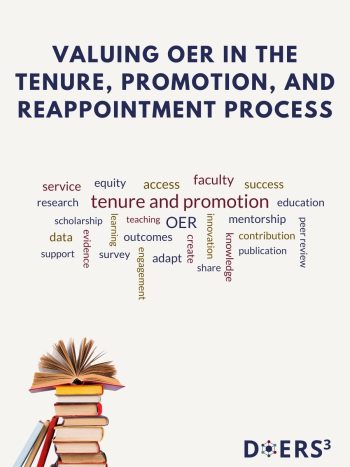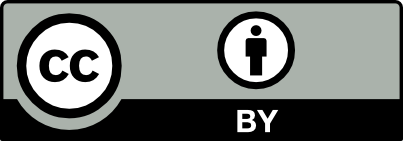Introduction, Purpose, and Benefits
The DOERS3 Collaborative, building on its previous work with the DOERS3 OER Contributions Matrix, has funded 28 authors for a book-length project centered around valuing open education work in the tenure, promotion, and reappointment process. These case studies written by faculty, staff, and administrators will detail their experiences trying to appropriately value OER and open educational work in that process.
A critical part of sustaining OER and open educational practices in higher education is recognizing the contributions by instructors who create and improve OER as part of their professional work. The OER community is very familiar with this issue and is hungry for examples for how others in the community are either navigating this process themselves or are assisting those who are. However, as the criteria for tenure and promotion can vary wildly between different types of institutions and even between different departments within an institution, answering questions about the role of OER in the tenure and promotion process can seem daunting. No “one size fits all” solution is going to solve the problem.
By collecting case studies from those who have experience, DOERS3 seeks to provide as many examples from as many types of institutions as possible so that those looking for answers to this problem can find solutions that speak to their particular issues. The goal of this project is to ultimately be the first stop for anyone asking, “How can I make open education work count toward the job security of myself and others?”
The DOERS3 Collaborative, building on its previous work with the DOERS3 OER Contributions Matrix, has funded 28 authors for a book-length project centered around valuing open education work in the tenure, promotion, and reappointment process. These case studies written by faculty, staff, and administrators will detail their experiences trying to appropriately value OER and open educational work in that process.
A critical part of sustaining OER and open educational practices in higher education is recognizing the contributions by instructors who create and improve OER as part of their professional work. The OER community is very familiar with this issue and is hungry for examples for how others in the community are either navigating this process themselves or are assisting those who are. However, as the criteria for tenure and promotion can vary wildly between different types of institutions and even between different departments within an institution, answering questions about the role of OER in the tenure and promotion process can seem daunting. No “one size fits all” solution is going to solve the problem.
By collecting case studies from those who have experience, DOERS3 seeks to provide as many examples from as many types of institutions as possible so that those looking for answers to this problem can find solutions that speak to their particular issues. The goal of this project is to ultimately be the first stop for anyone asking, “How can I make open education work count toward the job security of myself and others?”
 Cover image for Valuing OER in the Tenure, Promotion, and Reappointment Process book
Cover image for Valuing OER in the Tenure, Promotion, and Reappointment Process book
Valuing OER in the Tenure, Promotion, and Reappointment Process
Edited by Andrew McKinney
This book of case studies is meant to aid faculty, librarians, administrators, and staff members as they attempt to make their work or others' work on Open Educational Resources (OER) matter in the tenure, promotion, and reappointment process at their institutions.
Valuing OER in the Tenure, Promotion, and Reappointment Process Copyright © 2024 by Andrew McKinney is licensed under a Creative Commons Attribution 4.0 International License, except where otherwise noted.
Edited by Andrew McKinney
This book of case studies is meant to aid faculty, librarians, administrators, and staff members as they attempt to make their work or others' work on Open Educational Resources (OER) matter in the tenure, promotion, and reappointment process at their institutions.
Valuing OER in the Tenure, Promotion, and Reappointment Process Copyright © 2024 by Andrew McKinney is licensed under a Creative Commons Attribution 4.0 International License, except where otherwise noted.

